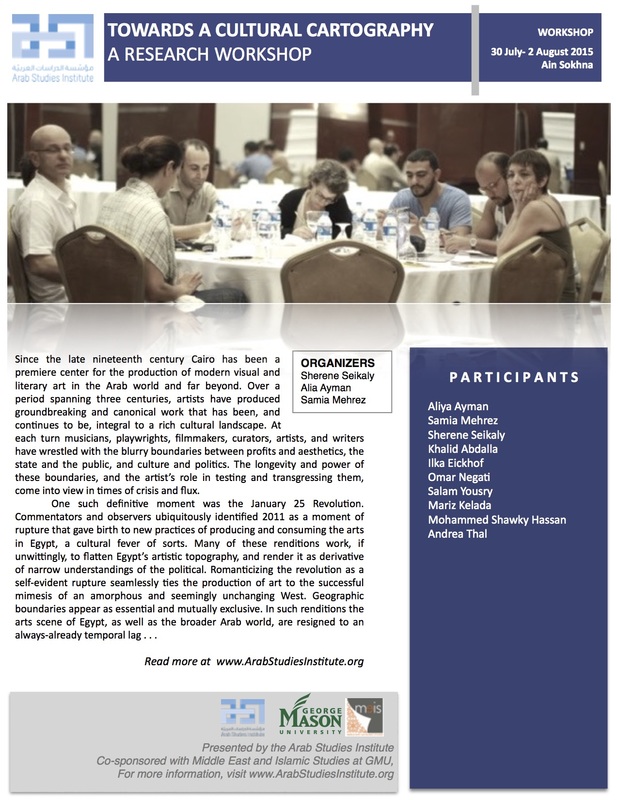- FAMA
- Researchers
-
Projects
- MESPI
- Knowledge Production Project >
-
Political Economy Project
>
- Development and the Uprisings
- Class Formations and Dynamics
- The Palestinian Economy: Fragmentation and Colonization
- Tunisia: A Political Economy in Transition
- Migrant States, Mobile Economies: Rethinking the Political in Contemporary Turkey
- Political Economy of the Middle East: Continuities & Discontinuities in Teaching & Research
- 2016 Political Economy Institute
- The Lebanon Project >
- The Palestine Project >
- The Civil Society Project >
- Middle East Media Project >
- The Egypt Project >
- Refugees and Migrants Project >
- Black-Palestinian Transnational Solidarities Project
- Initiatives
- Events
- Summer Institutes
- Internships
- Blog
TOWARDS A CULTURAL CARTOGRAPHY30 July 2015 - 2 August 2015
Ain El Sokhna, Egypt Since the late nineteenth century Cairo has been a premiere center for the production of modern visual and literary art in the Arab world and far beyond. Over a period spanning three centuries, artists have produced groundbreaking and canonical work that has been, and continues to be, integral to a rich cultural landscape. At each turn musicians, playwrights, filmmakers, curators, artists, and writers have wrestled with the blurry boundaries between profits and aesthetics, the state and the public, and culture and politics. The longevity and power of these boundaries, and the artist’s role in testing and transgressing them, come into view in times of crisis and flux.
One such definitive moment was the January 25 Revolution. Commentators and observers ubiquitously identified 2011 as a moment of rupture that gave birth to new practices of producing and consuming the arts in Egypt, a cultural fever of sorts. Many of these renditions work, if unwittingly, to flatten Egypt’s artistic topography, and render it as derivative of narrow understandings of the political. Romanticizing the revolution as a self-evident rupture seamlessly ties the production of art to the successful mimesis of an amorphous and seemingly unchanging West. Geographic boundaries appear as essential and mutually exclusive. In such renditions the arts scene of Egypt, as well as the broader Arab world, are resigned to an always-already temporal lag. More pernicious still, the fixation on revolutionary ruptures elides, if not erases, broader historical trajectories. By placing artistic practitioners, researchers, and institution builders in conversation, the conference created a space to begin mapping a cultural cartography in Cairo. A core group of artists, curators, and researchers sought to look beyond rupture to unearth historical continuity and repetition in artistic experience. We seek to study and reflect on the role of the arts in Egypt’s contemporary political and cultural landscape. To do so participants focused on a number of linked questions. What does it mean to “do culture” and art in the throes of both revolutionary and counterrevolutionary struggle? What are the conceptual and political implications of this labor? What is the relationship between European and North American funders and Egyptian producers in these creative economics? What can the history of the relationship between government ministries and cultural scenes teach us about this contemporary moment? Finally, how do cultural workers both challenge and support the state? |
HighlightsOrganizers
Sherene Seikaly Alia Ayman Samia Mehrez Papers & Presentations Sherene Seikaly, Alia Ayman, Samia Mehrez Introduction: Reflections on the Cultural Field Khalid Abdalla Towards a Cultural Cartography: On Strategies of Language Ilka Eickhof On Funding and Sustainability: Cultural Work in Egypt Omar Nagati and Beth Stryker On Mapping Cultural Initiatives and Revolution Salam Yousry Audiences, Revolutions, and Cultural Initiatives Mariz Kelada Independent or Precariously Alternative: The Movie Business in Egypt Mohammed Shawky Hassan On the Construction of Cultural Networks Andrea Thal |
- FAMA
- Researchers
-
Projects
- MESPI
- Knowledge Production Project >
-
Political Economy Project
>
- Development and the Uprisings
- Class Formations and Dynamics
- The Palestinian Economy: Fragmentation and Colonization
- Tunisia: A Political Economy in Transition
- Migrant States, Mobile Economies: Rethinking the Political in Contemporary Turkey
- Political Economy of the Middle East: Continuities & Discontinuities in Teaching & Research
- 2016 Political Economy Institute
- The Lebanon Project >
- The Palestine Project >
- The Civil Society Project >
- Middle East Media Project >
- The Egypt Project >
- Refugees and Migrants Project >
- Black-Palestinian Transnational Solidarities Project
- Initiatives
- Events
- Summer Institutes
- Internships
- Blog


